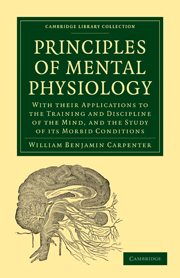 Principles of Mental Physiology
Principles of Mental Physiology Book contents
- Frontmatter
- PREFACE
- Contents
- BOOK I GENERAL PHYSIOLOGY
- CHAPTER I OF THE GENERAL RELATIONS BETWEEN MIND AND BODY
- CHAPTER II OF THE NERVOUS SYSTEM AND ITS FUNCTIONS
- CHAPTER III OF ATTENTION
- CHAPTER IV OF SENSATION
- CHAPTER V OF PERCEPTION AND INSTINCT
- CHAPTER VI OF IDEATION AND IDEO-MOTOR ACTION
- CHAPTER VII OF THE EMOTIONS
- CHAPTER VIII OF HABIT
- CHAPTER IX OF THE WILL
- BOOK II SPECIAL PHYSIOLOGY
- APPENDIX. DR. FERRIER'S EXPERIMENTAL RESEARCHES ON THE BRAIN
- INDEX
CHAPTER IV - OF SENSATION
Published online by Cambridge University Press: 29 August 2010
- Frontmatter
- PREFACE
- Contents
- BOOK I GENERAL PHYSIOLOGY
- CHAPTER I OF THE GENERAL RELATIONS BETWEEN MIND AND BODY
- CHAPTER II OF THE NERVOUS SYSTEM AND ITS FUNCTIONS
- CHAPTER III OF ATTENTION
- CHAPTER IV OF SENSATION
- CHAPTER V OF PERCEPTION AND INSTINCT
- CHAPTER VI OF IDEATION AND IDEO-MOTOR ACTION
- CHAPTER VII OF THE EMOTIONS
- CHAPTER VIII OF HABIT
- CHAPTER IX OF THE WILL
- BOOK II SPECIAL PHYSIOLOGY
- APPENDIX. DR. FERRIER'S EXPERIMENTAL RESEARCHES ON THE BRAIN
- INDEX
Summary
132. Sensation is that primary change in the condition of the conscious Ego, which results from some change in the Non-ego or External World,—this last term including the Bodily organism itself; for it is through the instrumentality of a certain part of the Nervous apparatus, that the change in the Non-ego is enabled to affect the Ego. A physical impression made upon an afferent nerve, is propagated by it to its Ganglionic centre forming part of the Sensorium; and according to the particular centre which is thus affected, will be the nature of the Sensation produced. Thus impressions on the Olfactive, Optic, or Auditory nerves excite sensations of Smell, Sight, or Hearing, in virtue of their transmission to the Olfactive, Optic, or Auditory ganglia respectively. This is proved by the fact that similar Impressions will produce entirely diverse Sensations, according as they are made on one or another of the nerves of Sense. Electric stimulation does this most effectively, producing in each Sensory nerve the change which is necessary to call forth the particular affection of the Consciousness to which it ministers; so that, by proper management, the Ego may be made conscious at the same time of flashes of light, of distinct sounds, of a phosphoric odour, of a peculiar taste, and of a feeling of pricking, all excited by the same stimulus, the effects of which are modified by the respective peculiarities of the instruments through which it operates.
- Type
- Chapter
- Information
- Principles of Mental PhysiologyWith their Applications to the Training and Discipline of the Mind, and the Study of its Morbid Conditions, pp. 148 - 175Publisher: Cambridge University PressPrint publication year: 2009First published in: 1874


